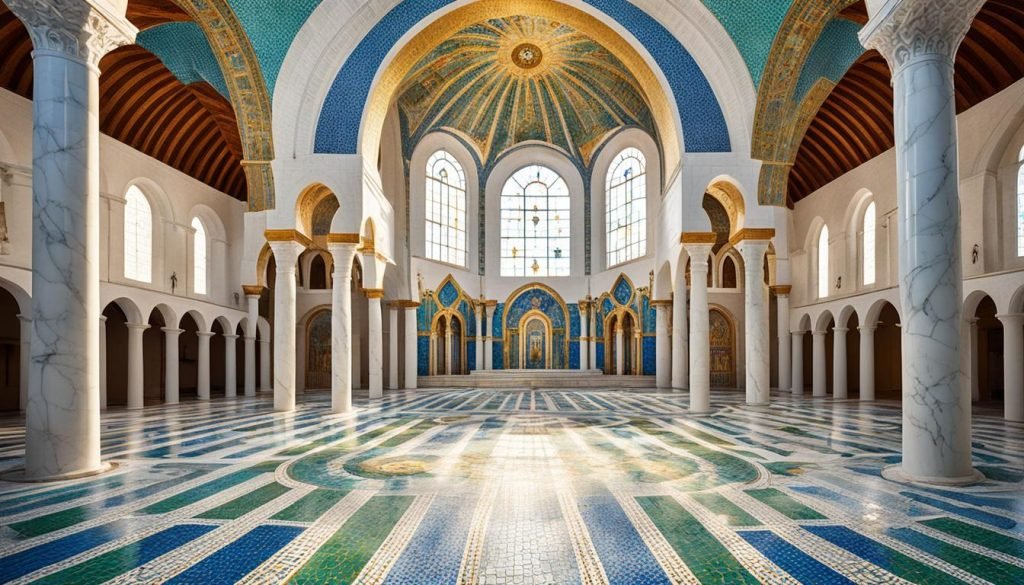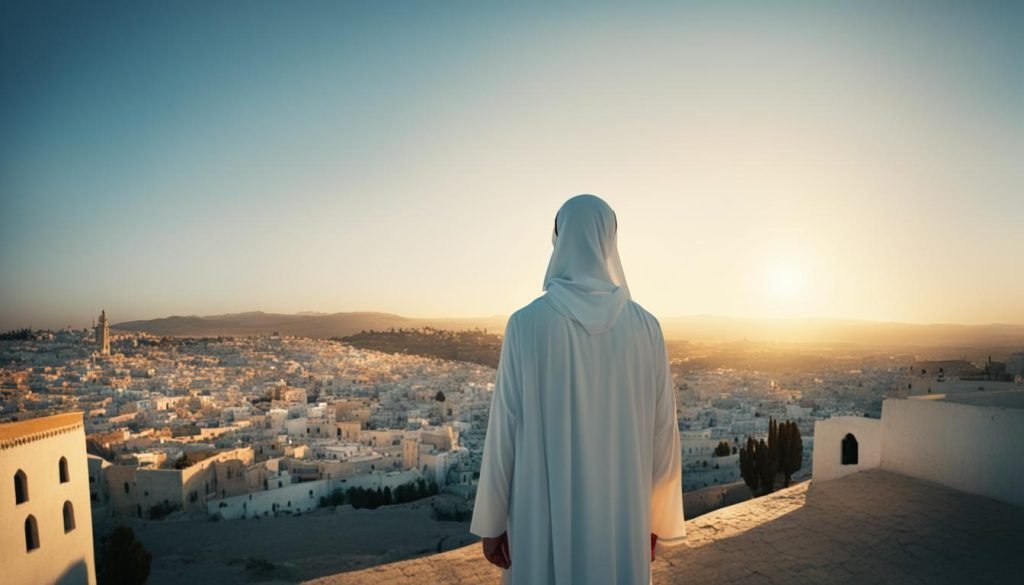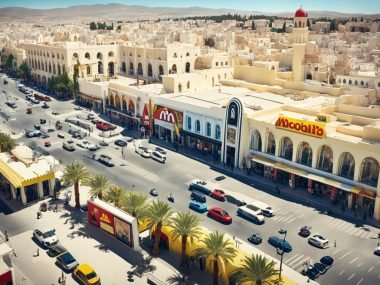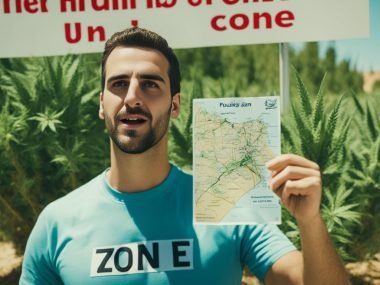Under the warm North African sun, among many languages and the scent of jasmine, my life has a different story. Living in Tunisia, known for its beauty and history, brings unique moments. Can one practise Christianity here as freely as Islam? Exploring Tunisia showed me its deep Islamic roots and a promise of religious freedom.
Look around, and you’ll see quiet yet powerful signs of Christian life. The peace at discreet church services, where hope and diverse stories meet, shows Tunisia’s social mix. But does my faith have the same freedom, or are there hidden challenges?
Walking among ancient ruins, I wonder about the real state of religious freedom for Christians in Tunisia today.
Talking with locals and expats, I learn about their brave stories. They share the challenges and joys of being Christian here. These stories highlight the power of faith and the need for caution in a mostly Islamic land.
Key Takeaways
- Understanding the coexistence of Christianity within a dominantly Islamic society in Tunisia.
- Acknowledging the constitutional commitment to religious freedom in Tunisia.
- Exploring the daily realities of practising Christianity in Tunisia from a personal perspective.
- Insights into the challenges faced by Tunisian Christians within a diverse religious landscape.
- Evaluating the visible and invisible barriers to religious expression in modern Tunisian society.
Understanding Tunisia’s Religious Demography
Tunisia is known for its mix of cultures and religions. This makes it fascinating for those looking into religious tolerance there. As someone who studies this, I’ve seen the range of beliefs and practices shaping Tunisian society.
Islam: The Dominant Faith in a Diverse Landscape
Most Tunisians are Sunni Muslims. Their beliefs and traditions have greatly influenced the nation for centuries. You can see Islam’s impact in the grand mosques and in daily Tunisian life. I’ve noticed how Islamic principles blend into everyday customs, showing a deep-rooted tradition in their society.
Christianity’s Presence in Tunisian History
While Christianity is less common in Tunisia, it has a long history that goes back to Roman times. About 30,000 Christians, mostly Catholic, live in Tunisia. They preserve a long history of cultural integration. I’ve had the honour of meeting some Tunisian Christians. They play a unique role in the country’s diverse culture.
The Jewish and Bahá’í Minorities
Tunisia’s religious mix also includes Jews and Bahá’ís. The Jewish community, mainly in Djerba, has kept their traditions alive for over two thousand years. There’s beauty in how they maintain their rich culture through time. The Bahá’í Faith, although smaller, promotes unity and plays a role in Tunisia’s religious tolerance.
| Religious Group | Estimated Population | Notable Characteristics |
|---|---|---|
| Sunni Muslims | Majority | Dominant faith; influential in culture and governance |
| Tunisian Christians | ~30,000 | Historic presence; mostly Catholic; integral to diversity |
| Jewish Community | Concentrated in Djerba; numbers not specified | Ancient heritage; cultural preservation |
| Bahá’í Faith | Small, established presence | Teachings focused on unity and peace |
The Legal Landscape for Religious Practice
My research into Tunisia’s laws on religion shows it respects religious freedom in Tunisia up to a point. The country has a strong Islamic identity. Still, its constitution promotes personal freedoms. This creates a unique mix. Islam is the main religion, but other beliefs are allowed. This sets a scene where Christian rights and the Tunisian constitution and religion can exist together.
Constitutional Provisions for Religious Freedom
I find the Tunisian constitution very interesting as a journalist. It aims to protect religious freedom but also names Islam as the main religion. This shows an attempt to blend modern values with tradition. It acknowledges Christian rights in Tunisia, but with some limits.
Laws Governing Places of Worship and Religious Expression
I’ve noted how Tunisia controls religious spaces. For Muslims, this means government support for mosques. Yet, Christians face challenges as some denominations lack official recognition. This difference highlights government control and prompts questions about religious freedom in Tunisia.
Looking at legal limits, it’s clear that rules shape how freely one can practice their faith. Christians can worship openly, but must follow public order and government rules. This situation makes one think about how government actions affect Christians’ daily lives in Tunisia.
I plan to keep exploring these issues. My goal is to provide a detailed view of religious life in a mainly Muslim society. It’s about seeing how promises in the constitution compare with real life.
Christianity and Islam in Tunisia: A Historical Context
Tunisia’s history is rich with religious stories. Christianity and Islam have both shaped the country’s culture. Let’s explore how these faiths evolved in Tunisia over time.
The Emergence of Christianity in Roman Tunisia
Christianity first arrived in Tunisia during the Roman era. It grew quickly, leaving a trail of ancient churches. These early Christians created a lasting legacy with their religious artefacts.

Islam’s Rise and the Decline of Christianity
Then, Islam began to spread with the Islamic conquests in North Africa. Christianity’s influence started to fade as Islam became more popular. However, Christian sites and a small community remained, keeping the faith’s legacy alive.
| Time Period | Dominant Religion | Notable Changes |
|---|---|---|
| Roman Era | Christianity | Flourishing of Christian communities and construction of religious structures. |
| Islamic Conquests | Islam | Spread of Islam leading to the transformation of religious and cultural landscapes. |
| Present Day | Islam | Existence of minority Christian communities and preservation of historical religious sites. |
Looking at Tunisia’s religious history helps us understand its current faith dynamics. The stories from the past shape Tunisia’s diverse society today.
The Christian Community in Tunisia Today
Exploring the Christian community in Tunisia, I discovered a blend of faiths. They live peacefully in a Muslim-majority setting. Christianity stays strong here, thanks to various groups and the deep faith of local believers. This community’s story is rich with history, cultural exchange, and modern expressions of belief.
Roman Catholics, Orthodox Christians, and Protestants
The Roman Catholic Church is a key figure in Tunisia for expats and some locals, despite being few. Orthodox and Protestant Christians add to this spiritual mix, making the country’s faith scene more diverse. These groups stand together, facing the challenges of being a minority with courage and dignity.
“In Tunisia, our diversity in belief fortifies our unity in purpose. We come together, not just to worship but to serve, to learn, and to celebrate our shared humanity.” – Reflection from a local Protestant leader.
Christian Believers from Muslim Backgrounds
A growing number of Tunisian Muslims are turning to Christianity. These changes are personal and spiritual but come with social challenges. The Christian community supports these new members, understanding the difficulty of changing your faith in a culturally tight-knit society.
| Denomination | Population Estimate | Primary Activities | Key Challenges |
|---|---|---|---|
| Roman Catholic | 20,000+ | Religious services, charity work | Societal pressure, legal recognition |
| Orthodox | 5,000+ | Cultural events, religious education | Integration, community outreach |
| Protestant | 3,000+ | Community service, fellowship gatherings | Public perception, evangelism restrictions |
Religious Tolerance in Tunisia: Reputation vs Reality
In my analysis, Tunisia’s reputation for cultural openness versus reality for religious minorities is clear. Tunisia has a rich history of religious diversity. However, for communities like Christians, the picture is complex.
Looking at Tunisian society and religion reveals challenges. It’s tough to balance traditional views and progressive ideas of religious freedom. This tension shows a society struggling with both diversity and traditionalism.
Cultural Openness and Challenges Faced
Despite promises in their constitution, religious minorities in Tunisia face societal hurdles. While cultural openness may suggest acceptance, reality paints a different picture. Here, religious freedom meets traditional expectations and minorities aim to find their place.
The Impact of Societal Attitudes on Religious Freedom
The official stance on religious tolerance and societal attitudes often don’t match in Tunisia. This difference greatly affects those moving away from Islam. It complicates the expression of religious freedom, balancing private beliefs against public identity.
Let us consider the following table, which summarises the current facets of: Religious Tolerance and Freedom in Tunisian Society.
| Aspect | Official Stance | Societal Reality |
|---|---|---|
| Religious Tolerance | Constitutionally upheld | Varies by region and community |
| Freedom of Religion | Recognised by the state | May conflict with societal norms |
| Conversion | Legally permissible | Can lead to societal pressure to conceal new faith |
This analysis highlights the need to view religious tolerance in Tunisia through various lenses. It discusses the debate on religious freedom and how Tunisian society and religion come together and apart in interesting ways.
Practising Christianity in Tunisia: Rights and Restrictions
Exploring how Christians live their faith in Tunisia reveals a mix of freedom and limits. They face unique challenges. Their experience shows the struggle between enjoying their rights and facing society’s limits. This situation opens a discussion on living together with diverse religions and respecting each other’s beliefs in Tunisia.
Governmental Control Over Religious Activities
The way Christians can practise their faith in Tunisia is largely influenced by the government. Although the constitution supports religious freedom, the reality is stricter. There’s a close watch by the government on religious groups. This affects how Christians can worship and help others. Particularly, sharing their faith publicly is restricted. This shows how the state controls religious expressions.
Challenges for Tunisian Christians in Practising their Faith
I’ve talked with many Christians in Tunisia. They face many daily challenges, especially those who have converted. They often have to hide their faith. Revealing it can lead to serious problems like losing family or job. Their stories show the deeper issue of religious freedom in Tunisia. It’s not just about laws but also about battling cultural and religious norms. Choosing to follow Christianity under these circumstances shows courage and a fight for one’s rights.
| Right or Activity | Governmental Position | Real-life Application |
|---|---|---|
| Worship Services | Permitted | Regular church activities |
| Charitable Works | Encouraged | Alms-giving and social services |
| Public Evangelism | Prohibited | Non-convertible; personal evangelism under scrutiny |
| Conversion to Christianity | Unofficially discouraged | Closeted faith; societal stigmatisation |
In conclusion, practising Christianity in Tunisia involves navigating a complex mix of rights and limits. Finding balance between freedoms and restrictions defines the Christian experience there. It shows a delicate co-existence that’s still adapting within Tunisia’s social and religious fabric.
The Tunisian Church: An Overview of its Structure and Activities
The Christian churches in Tunisia present a vivid mix of faith, culture, and kindness. They stand proud in a mostly Muslim country. Even though they might not always be visible, they play a big role in many people’s lives. Today, I want to shine a light on the structure and various activities of these churches. They greatly contribute to the church’s story in Tunisia.
Locations and Demographics of Tunisian Churches
In Tunisia, Christians form a small group. This includes people from abroad and a few locals. They find peace in different church denominations. These range from grand Catholic cathedrals to simple Protestant prayer places. You can find these peaceful spots all over the country. They’re mainly in cities but also serve in hidden spots.
Church-led Initiatives and Community Involvement
The work of Tunisian churches goes beyond just Sunday prayers. They are deeply involved in education, healthcare, and cultural events. This shows how Christians put their values of service and love into action. The churches work together towards common goals. They help improve society in Tunisia and build bridges between different parts of the community.
| Denomination | Location | Services Provided | Community Outreach |
|---|---|---|---|
| Catholic | Tunis, Sousse | Education, Mass, Counselling | Charitable Works, Interfaith Dialogues |
| Protestant | Tunis, Bizerte | Bible Study, Worship Gatherings | Social Services, Language Classes |
| Orthodox | Djerba, Hammamet | Liturgical Services, Baptisms | Cultural Heritage Preservation |
| Anglican | Tunis | Communion Services, Marriage Ceremonies | Youth Programmes, Environmental Initiatives |
Every part of the Tunisian church brings its own history and traditions. But it also works with the local community. This creates unity and helps everyone grow together.
Religiosity in Tunisia: A Survey of Beliefs
In Tunisia, I’ve seen a remarkable change in religious diversity. The talks on religious beliefs in Tunisia show a broader range now, proving Tunisian spirituality is evolving.
Shifts in Religious Identification Among Tunisians
Recent research shows changes in how Tunisians see their faith. There’s a big move towards secular views, especially among the young. Although Islam is still the main religion, more young people are exploring different spiritual paths or even no religion at all.
The Correlation Between Age and Religious Affiliation
Talking to people across Tunisia, it’s clear age affects one’s religious ties. Older folks generally follow Islamic beliefs. On the other hand, the young are leaning more towards secularism. This shows a shift towards valuing personal freedom and varied religious expressions.
| Age Group | Religious Belief | Percentage Identifying as Non-Religious |
|---|---|---|
| Youth (18-29) | Secular / Non-religious | 20% |
| Middle Age (30-49) | Mixed Beliefs | 10% |
| Older Adults (50+) | Islamic | 5% |
The graph above opens our eyes to the religious diversity in Tunisia. It highlights the growing variety of beliefs, especially among the younger generation, as Tunisia moves forward.
Religious Identity and Personal Rights in Tunisia
In Tunisia, the connection between personal rights and religious identity is clear. It’s important to talk about how changing one’s faith, especially to a different religion, affects more than just the person. Religious conversion in Tunisia shows the state’s dual role. It acts as a moral guide and protects Islam, its state religion. This influences the freedoms of individuals, especially concerning changing religions.
Consequences of Religious Conversion
Changing one’s faith in Tunisia is a serious matter. Those who switch from Islam to Christianity face many challenges. They don’t just deal with spiritual changes. They also risk being socially excluded and face personal dangers. Their religious rights in Tunisia are questioned when they go against the majority’s beliefs.

The Role of the State as a “Guardian of Religion”
The state having control over religion adds another challenge. The government sees itself as the religion’s protector. It looks at religious rights in Tunisia as less important than community and history. This makes it hard for people who follow a different faith than the state religion to practice freely. Converts face legal and social problems. They must choose between their cultural identity and their personal rights.
International Perspectives on Religious Freedom in Tunisia
I’m looking into the debate about religious freedom across the world. It leads me to look closely at religious persecution in Tunisia. I also see how Tunisia ranks globally in terms of religious freedom. The world’s view on these matters shows how Tunisia is doing and what challenges it faces in promoting religious tolerance.
Global Rankings and Tunisia’s Score for Religious Freedom
Global rankings help us see how free religion is internationally, including in Tunisia. Reports from different organisations show Tunisia has moderate restrictions on religion. There has been progress, but there’s still work to do. We need to improve the state of religious freedom in Tunisia.
Recommendations from International Bodies on Improving Religious Liberty
International recommendations aim to improve Tunisia’s global ranking on religious freedom. They suggest legal recognition of all religions to stop marginalisation. It’s also important to fight against discrimination. This will support diversity and equality. Encouraging dialogue between religions is crucial. It’s key for growing religious freedom.
| Criteria | Observations | Recommendations |
|---|---|---|
| Legal Recognition | Incomplete across all groups | Extend legal status to all religious communities |
| Discrimination Measures | Reports of bias and marginalisation | Implement anti-discrimination laws and policies |
| Interreligious Dialogue | Limited platforms for exchange | Promote and facilitate platforms for peaceful interfaith communications |
Looking at this topic through an international lens is very helpful. It gives us insights and steps forward. It guides Tunisia towards peace, no matter what one believes. As someone watching these developments, it’s important for me to highlight these discussions. They help us respect religious diversity everywhere.
Conclusion
In my study of religious tolerance in Tunisia, I found a country deeply rooted in Islam. Yet, it also cherishes a rich mix of beliefs. This delicate balance shows Tunisia’s commitment to its diverse heritage and modern challenges. The constitution promises religious freedom in Tunisia, shining a light of hope. However, the daily lives of Tunisian Christians reveal a more complicated situation. They enjoy freedom, but also face trials, especially when moving from Islam to Christianity.
Looking at Tunisia’s religious landscape, there’s a noticeable presence of Christianity in Tunisia. This holds up despite the challenges from society and law. Converts sometimes face backlash and must practise in secret. Yet, I see a Tunisia that’s changing and connecting with the wider world. This connection fosters hope for a future where diverse beliefs are more accepted. Dialogues with global groups and the government’s efforts suggest promising changes. These efforts aim to bridge old traditions and new, more open values.
I’m cautiously hopeful about Tunisia’s future. Its story is being written every day by brave believers and a society that’s learning. They strive to blend deep-rooted beliefs with rights for all. For Tunisian Christians, their path is filled with both hurdles and chances for peace. The country’s move towards accepting more religions is a sign of its ongoing journey. It shows the efforts to create a more welcoming and diverse national identity.







